





简单句的定义: 只有一套主谓系统的句子
简单句的组成: 主干成分+修饰成分
Put a tick (√) next to the right sentences.
1. Made in Italy.
2. This wallet was made in Italy. √
3. To write a letter.
4. Standing under the tree.
5. I want to write a letter.
6. Is short.
7. Do you like?
8. The bus has arrived.
9. Have finished my assignment.
10. You should listen.
11. Sit down.
12. You can't hit me.
13. Don't interrupt.
14. I comprehend.
15. He doesn't like me.
16. Under the water.
17. Ate.
18. A bottle of water.
19. He's a teacher.
20. What happened?
 1.1.1 主干成分
1.1.1 主干成分
主语 ( subject ):一句话的主体,全句述说的对象,常用名词或相当于名词的词担任,一般置于句首。
E.g.He loves dogs.
谓语或谓语动词 ( predicate or predicate verb ):说明主语的动作,常用动词担任,置于主语之后。
E.g. Helovesdogs.
谓语单一性:
A.一个简单句有且仅有 一个谓语 ,由 简单谓语 或者 并列谓语 组成。
B.在英语中,担任谓语成分的只能是 动词 。
We always have to use an object after some verbs: e.g.beat, contain, enjoy, hit, need.
及物动词 ( transitive verb ):及物动词要求有直接宾语。
不及物动词 ( intransitive verb ):不及物动词可以有一个或两个(直接和间接)宾语或复合宾语。
She married. 此处marry作不及物动词。
She married him. 此处marry作及物动词。
Note the terms:
Transitive: =followed by a noun or pronoun object
Intransitive: =not followed by a noun or pronoun object
Type 1: Verb + Preposition (transitive): e.g.Listen to this record. Listen to it. Listen!
Type 2: Verb + Particle (transitive): e.g.Take off your hat. Take your hat off. Take it off.
Type 3: Verb + Particle (intransitive): e.g.Hurry up! Sit down!
Type 4: Verb + Particle + Preposition (transitive): e.g.We've run out of matches.
Supply the missing prepositions.
1. I don't agree with your proposal.
2. Mr. White suffers_____asthma.
3. Please don't insist_____paying the fee.
4. I wouldn't think_____borrowing pencils.
5. These two paintings differ_____each other.
6. Choose_____the two.
7. Where did you see_____it?
8. I'm depending_____you.
9. We can only guess_____the truth.
10. Please wait_____my mother.
11. Knock_____the door.
12. Ask_____the menu.
13. I don't agree_____him.
14. How do you know_____this?
15. Does this scarf belong_____you?
16. Let's begin_____potato soup.
17. Can you took_____the children for tomorrow night?
18. I couldn't wish_____a nicer place to work.
19. We failed_____our attempt to win the competition.
20. You can't reason_____him.
21. This pie tastes_____onion.
22. I don't believe_____tales.
23. I succeeded_____starting the new business.
24. The police are looking_____the murders.
Supply the missing prepositions.
1.I've arranged a trip for you.
2. He accused me_____robbery.
3. You can't conceal the truth_____me.
4. Would you kindly explain this_____my boyfriend?
5. Invest some facilities_____this company.
6. I can't advise you_____your personal life.
7. Insure your farm_____storm damage.
8. Translate this paper_____Spanish for my professor.
9. I'll reserve a seat_____him.
10. You remind me_____my grandma.
11. Don't associate me_____them.
12. Can you forgive me_____what I did?
13. They robbed me_____my bag.
14. Don't repeat this_____anyone.
15. He can't blame me_____this.
16. Ann stoles money_____the firm.
Fill in the blanks with in, at, for, from, of, on, out of or to . Use each word at least once.
IS THERE ANYBODY HERE?
A dentist in Bavaria has been haunted by a voice which swears (1) at him all the time. The voice comes (2)_____light sockets, washbasins and the telephone. It is a sharp, deep voice which laughs (3)_____the dentist and mocks him. The poor dentist is suffering (4)_____a bad case of nerves. Recently, the voice was recorded and broadcasted, so now everyone in Bavaria is looking (5)_____the ghost, but so far no one has succeeded (6)_____finding it. People who don't believe (7)_____ghosts think it is just a practical joke. The voice always shouts (8)_____the dentist, but speaks sweetly (9)_____his 17 years old assistant, Claudia. But no one can blame Claudia (10)_____the behavior of the ghost or accuse her (11)_____playing tricks (12)_____her poor boss. Engineers don't know what to make (13)_____it. "He's a technical genius,” one of them said. The ghost has responded (14)_____all this activity by saying. In a thick Bavarian accent, "You'll never get hold (15)_____me!”
Match these verb phrases (1-15) with the explanations on the right (A-O) after you have tried to explain them in your own way.
c
Match these verb phrases (1-17) with the explanations on the right (A-Q) after you have tried to explain them in your own way.
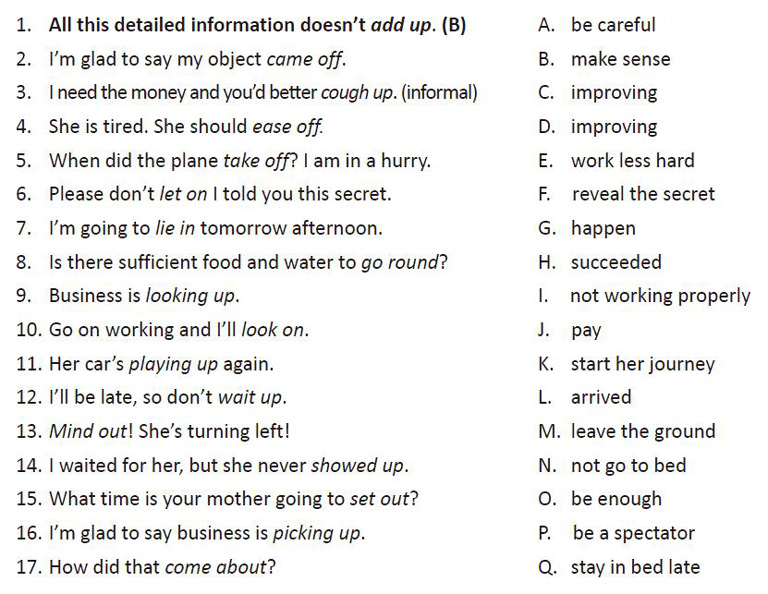
Match these verbs (1-20) with the explanations on the right (A-T) after you have tried to explain them in your own way.
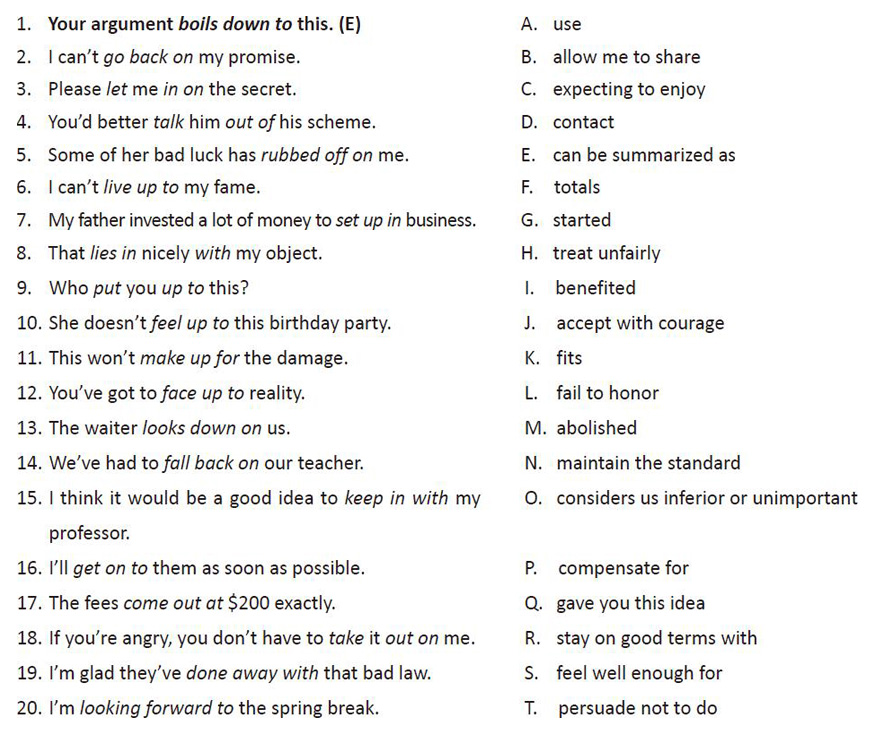
宾语 (object):表示及物动词的动作对象和介词所联系的对象,常由名词或相当于名词的词担任。置于及物动词或介词之后。
★介词后面必须要有宾语。
请在下列有宾语的句子前标记“√”,并用()标出不及物动词:
□Things change.
□NObody went.
□My sister will fix everything.
□He ate a cake.
□We never beat children.
□He laughed.
Complete the following sentences using words in the brackets.
1. You must declare (the Customs/ this camera) this camera to the Customs.
2. Aren't you going to introduce (me/ your family)?
3. You can say (me/ what you like).
4. Who suggested (this plan/ you)?
5. She confessed (her crime/ the police).
6. Alice have never admitted (anyone/ this).
7. Can you describe (me/ this woman)?
8. Please don't tell (this/ anyone).
9. I'm going to report (this/ the president).
10. I don't want you to repeat (what I told you/ Mr. Potter).
Tick (√) to show whether for means "instead of" or "for your/ my benefit".
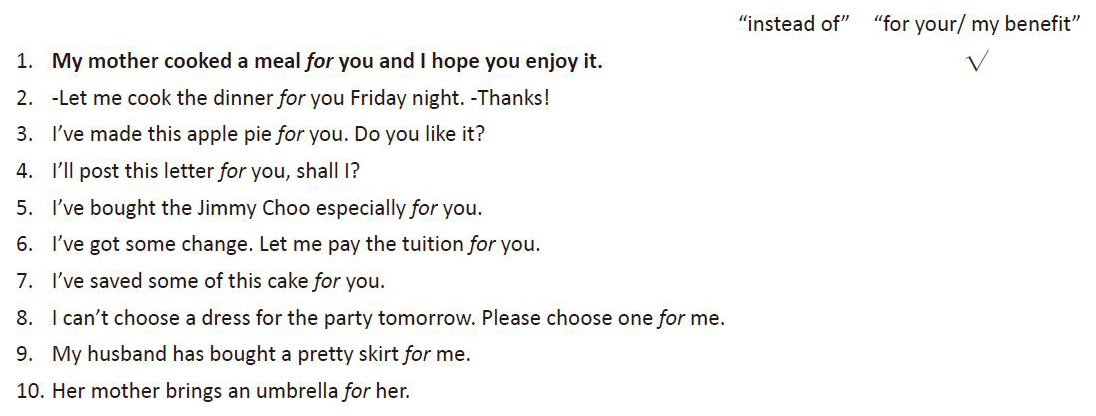
Arrange these words in the right order. The first letter of each sentence should be capitalized. Mark each rewritten sentence with S, V, O, M, P, and T to show: Subject, Verb, Object, Manner (How?), Place (Where?), Time (When?).
1. till 11 o'clock this morning | slept | the children S The childrenVsleptTtill 11 o'clock this morning.
2. the papers | into the bin | Tim | threw
3. she | doesn't speak | well | English
4. hides | Mrs. Love | her golden ring | under the bed
5. carefully | this luggage | She | didn't pack
6. on the bed | I | left | this morning | my phone
7. from the bank | a loan | Susan | has to get
8. My roommate's phone | in the middle of the night | woke me up
9. in the campus | you | shouldn't walk | at night
10. your burger | you | should eat | slowly
11. my term | begins | in August
12. your essay | I | quickly | last night | in bed | read
表语 (predicative):位于系动词之后的对主语的描述成分。
请圈出表语:
☆Mr. Turner is an artist.
☆I am fine.
☆She became a lawyer.
☆That sounds good.
Complete these sentences using different complements. Mark whether it's a noun, an adjective, an adjective + noun, etc.
1. My neighbor is very tall . (adj.)
2. My neighbor is_____.
3. This passion fruit tastes_____.
4. The children are_____.
5. The meeting is_____.
6. Whose is this? It's_____.
7. John looks_____.
8. That music sounds_____.
9. Your mother seems_____.
10. I want to be_____when I leave school.
补语 (complement):用来补充主语和宾语的意义,一般都着重说明主语或宾语的特征,常由名词或形容词担任。
请圈出补语:
☆His joke made me laugh.
☆I found the book easy.
☆I found a boy crying in the corner.
☆I'll let him go.
基础句型: 主干成分的五种组合方式。
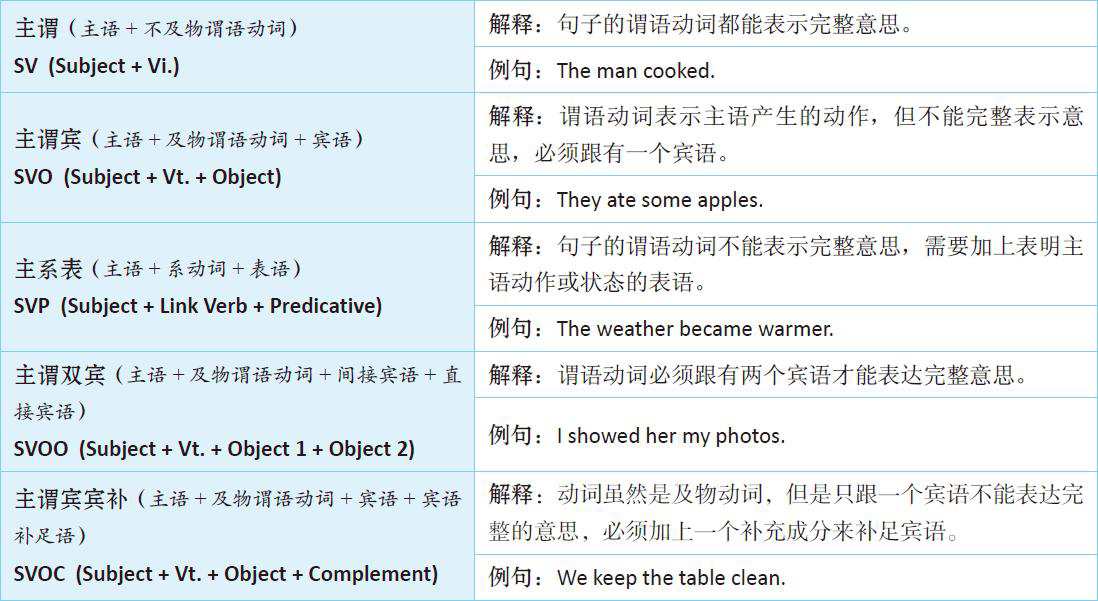
Choose the correct type of the following sentences.
1. She is a teacher. □SV □SVO □SVP □SVOO □SVOC
2. My mother bought me a necklace. □SV □SVO □SVP □SVOO □SVOC
3. He arrived late as usual. □SV □SVO □SVP □SVOO □SVOC
4. I found it difficult to learn English. □SV □SVO □SVP □SVOO □SVOC
5. I feel cold. □SV □SVO □SVP □SVOO □SVOC
6. Please pass me some salt. □SV □SVO □SVP □SVOO □SVOC
7. I married him last year because of the baby. □SV □SVO □SVP □SVOO □SVOC
8. I am tired. □SV □SVO □SVP □SVOO □SVOC
9. She married at a young age. □SV □SVO □SVP □SVOO □SVOC
10. The books are on the desk. □SV □SVO □SVP □SVOO □SVOC
11. I sent him an apple last night. □SV □SVO □SVP □SVOO □SVOC
12. The weather gets hot in summer. □SV □SVO □SVP □SVOO □SVOC
13. She looks beautiful. □SV □SVO □SVP □SVOO □SVOC
14. Overwork doesn't pay. □SV □SVO □SVP □SVOO □SVOC
15. My father bought me a car. □SV □SVO □SVP □SVOO □SVOC
16. The water in the bottle is clean. □SV □SVO □SVP □SVOO □SVOC
17. The smell made me sick. □SV □SVO □SVP □SVOO □SVOC
18. My father became a teacher in 1978. □SV □SVO □SVP □SVOO □SVOC
19. I couldn't eat another portion. □SV □SVO □SVP □SVOO □SVOC
20. Time flies. □SV □SVO □SVP □SVOO □SVOC
21. The flower smells good. □SV □SVO □SVP □SVOO □SVOC
宾补前置现象: 在部分情况下(如,宾语有过长修饰或宾补与谓语为固定搭配时),宾语补足语可以置于宾语之前,形成句式:主+谓+宾补+宾。
Underline the object complements.
1. The Japanese invaders laid waste the city in 1941.
2. Tom, don't let loose the dog , it would run away.
3. Let go the concepts of terms , and come to the very essence of the matter.
4. He proved worthy of confidence his friends who he made with when he studied at university.
5. Electronics did in fact make possible sounds that no instrument up to that time could produce.
6. He awoke one morning to find seated beside him an officer who came to see if he had recovered from his wound.
7. At a distance we heard roaring over the stormy sea both winds and thunders that kept the greedy tradesmen from sailing on.
8. We hold in high esteem the improvement of relations between our two countries, the solid foundation for promoting friendship and enhancing cooperation in the future.
Multiple choices.
1. Long before children are able to speak or understand a language,_____communicate through facial expressions and by making noises.
(A) however
(B) they
(C) furthermore
(D) who
2. _____were stones piled at intervals.
(A) The earliest road markers
(B) The earliest road markers, which
(C) Road markers were the earliest
(D) Until the earliest road markers
3. _____became a state in 1876.
(A) When Colorado
(B) Colorado
(C) It was Colorado
(D) Colorado, which
4. _____,The Yearling, won a Pulitzer Prize.
(A) Marjorie Rawlings' best work was
(B) Marjorie Rawlings' best work
(C) Her best work was Marjorie Rawlings'
(D) That Marjorie Rawlings' best work
5. When water freezes in the cracks of rocks,_____expands, causing the rocks to break apart.
(A) it
(B) but
(C) then
(D) and
6. The second-oldest continuously occupied governor's mansion in the United States_____Jackson, Mississippi.
(A) the location in
(B) is the location
(C) is located in
(D) located in
7. The Sherman Antitrust Actof 1890_____nearly unanimously through the United States Congress.
(A) passed
(B) in passage
(C) having passed
(D) passing
8. Of the millions who saw Haley's comet in 1986, how many people_____long enough to see it return in the twenty-first century.
(A) will they live
(B) they will be living
(C) will live
(D) living
9. In many areas the slope and topography of the land_____excess rainfall to run off into a natural outlet.
(A) neither permit
(B) without permitting
(C) nor permitting
(D) do not permit
10. Many gases, including the nitrogen and oxygen in air,_____color or odor.
(A) have no
(B) which have no
(C) not having
(D) they do not have
11. Physics has retained_____.
(A) its original aim
(B) it aimed originally
(C) its original aim was
(D) aiming originally
12. Adhesions are_____formed within the body in response to inflammation or injury.
(A) that thin bands of scar tissue
(B) they thin bands of scar tissue when
(C) thin bands of scar tissue
(D) thin bands of scar tissue able to
13. _____a lonely and rugged life, far from home and family.
(A) However the early gold prospector often lived
(B) The early gold prospector often lived
(C) Not only did the early gold prospector often live
(D) The early gold prospector often living
14. During an eclipse of the Sun,_____in the shadow of the Moon.
(A) the Earth lies
(B) the Earth when lying
(C) that the Earth lies
(D) the lying Earth
15. _____social nesting birds that build their nests in trees and on cliffs.
(A) The most storks
(B) Most are storks
(C) Most storks are
(D) Storks most
16. In an area first explored by Samuel de Champlain,_____.
(A) establishment of the city of Halifax in 1749
(B) in 1749 the city of Halifax established
(C) in 1749, establishing the city of Halifax
(D) the city of Halifax was established in 1749
Correct the sentences.
1. The Appalachian Mountains (A) formation a natural barrier (B) between the eastern seaboard and the vast (C) lowlands of the continental (D) interior of NOrth America.
2. Found in (A) wild woods and (B) stony places, the Canterbury bell never (C) flowering until the second (and final) (D) summer of its life.
3. Choreographer Martha Graham's (A) pioneering technique, designed to express (B) inner emotion through dance forms, (C) representative the first real (D) alternative to classical ballet.
4. Tariffs (A) preventing the most efficient use of the world's (B) resources by (C) restricting division of labor to (D) national boundaries.
The underlined sentences are:
A. Subject B. Object C. Predicative
1. What he can do is to take the crying baby home.
2. We know that you must be hungry .
3. That is why I came here late .
 1.1.2 修饰成分
1.1.2 修饰成分
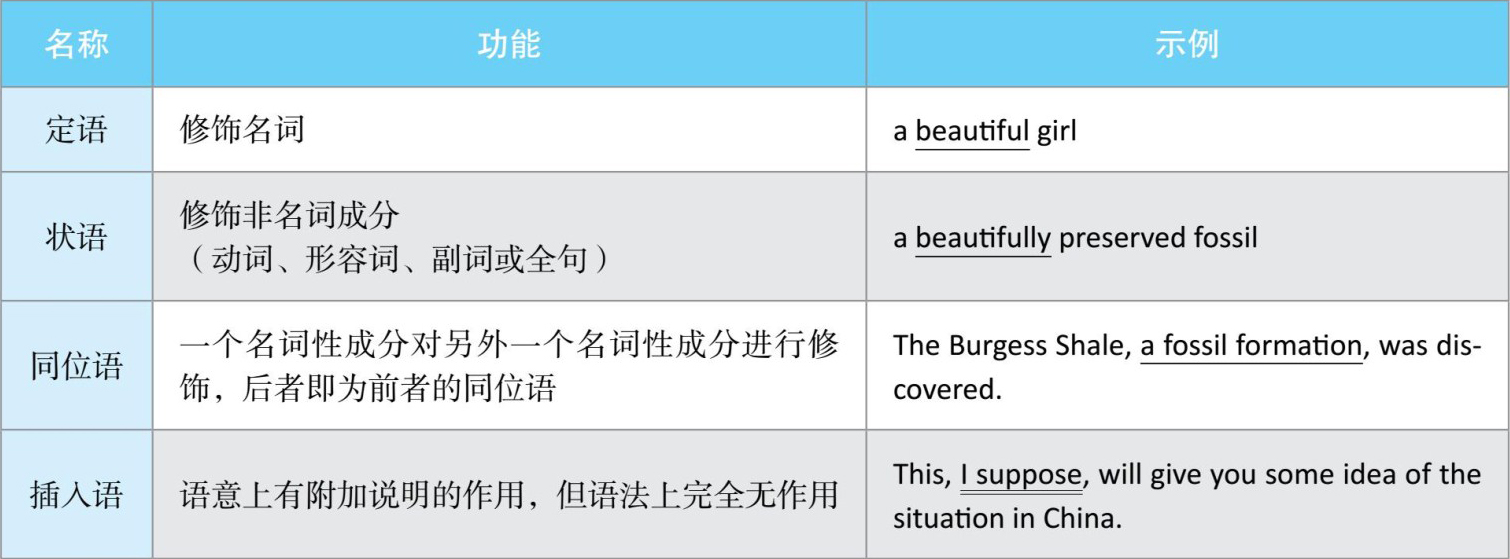
(1)定语
*在定语+名词短语中,定语修饰的对象为该短语的核心词(headword)。
a three-quartermajority
a famous Americanuniversity
a new plasticbucket
a bookon the desk
Underline the headwords.
1. an elegant German clock
2. an interesting little red French oil painting
3. purple velvet curtains
4. The newly-wedded couple bought a large round green Danish-made bed.
后置定语
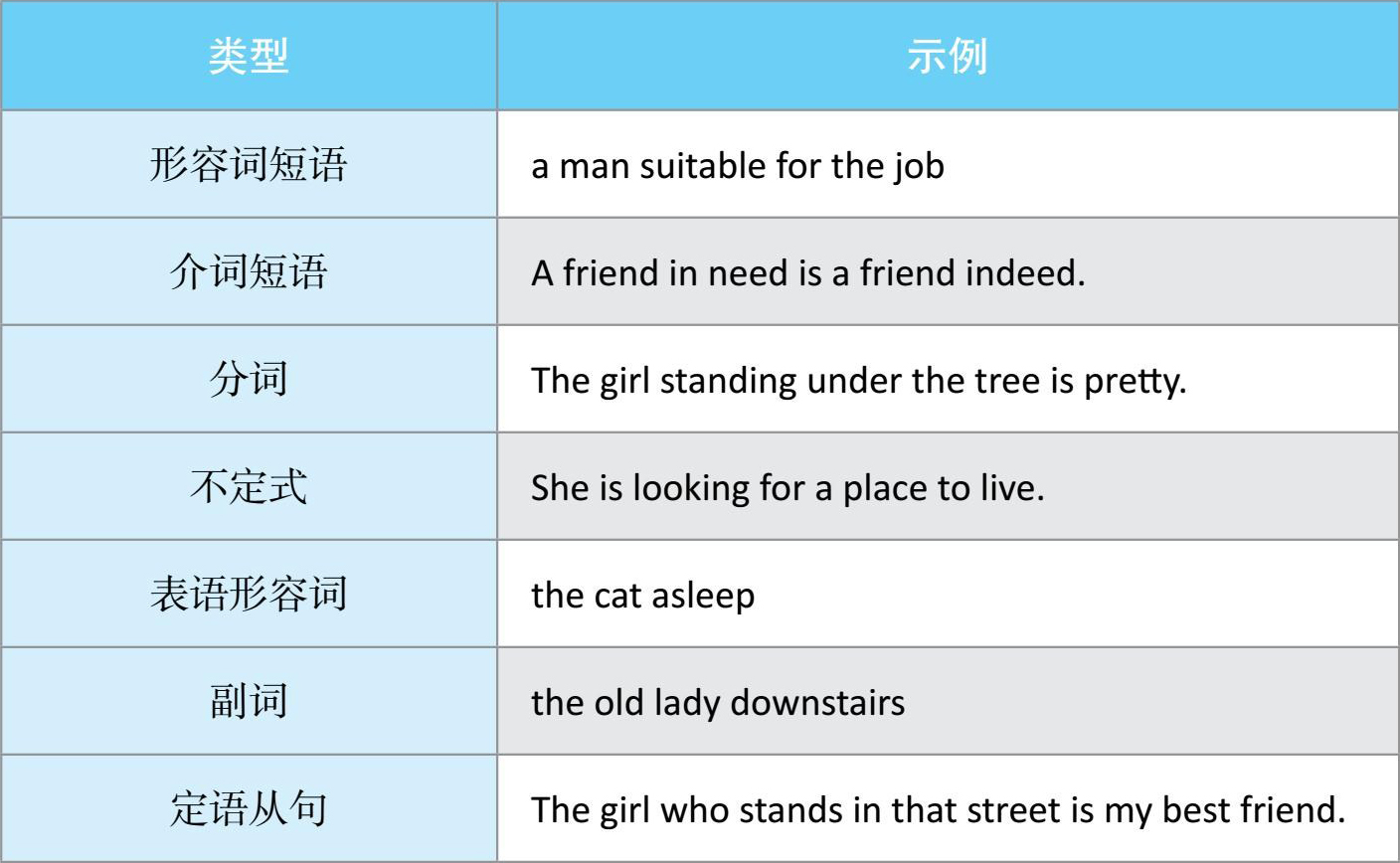
Underline the postpositive attributives of the following sentences.
例:Most of the people singing are students.现在分词作后置定语
1. He is the only man alive in the accident.
2. A man so difficult to please must be hard to work with.
3. She has a lot of housework to do.
4. Her speech yesterday was a signal that her views have changed.
5. The life tomorrow will be more comfortable.
6. This is the shortest way leading to the station.
7. The friendship between the two countries will last forever.
8. The boats afloat were not seen by the enemy.
9. We need a place twice larger than this one.
10. The watches made in Switzerland are very expensive.
11. Albert Einstein was the first to suggest the existence of stimulated emission in a paper published in 1917.
12. The modem automobile is a system of complex technical composed of more than 14,000 parts.
13. The increased value placed on the idea of the family also helps to explain this rise in birth rates.
14. Our views about the nature of the early plant and animal communities are now being revised.
Fill in the blanks.
1. The only way to protect this fragile and important part of the planet is to stop tourists from traveling to Antarctica(南极).
该句的非谓语动词是:____________________
它所表达的含义是:_______________(被动完成/将来目的/主动进行)
2. In addition, water heated geothermally(地热地)can contain salts and toxic materials dissolved from the hot rock.
该句的非谓语动词是:____________________
它所表达的含义是:_______________(被动完成/将来目的/主动进行)
3. When you go online, you can find many websites offering products and services such as medical treatment and legal advice.
该句的非谓语动词是:____________________
它所表达的含义是:_______________(被动完成/将来目的/主动进行)
小结:
不定式作定语,表示将来目的。
过去分词作定语,表示被动完成。
现在分词作定语,表示主动进行。
注意:主句中谓语动词的识别。
Fill in the Blanks.
1. Water circulated(循环)through heat reservoirs in this temperature range is able to extract enough heat to warm residential(住宅的), commercial, and industrial spaces.
句子中非谓语动词作定语的部分是从_____到_____(填写单词)。
2. A third fossil formation containing both soft-bodied and hard-bodied animals provides evidence of the result of the Cambrian explosion.
句子中非谓语动词作定语的部分是从_____到_____(填写单词)。
3. The principal seagoing ship used throughout the Middle Ages was the galley, a long, low ship fitted with sails but driven primarily by oars.
句子中非谓语动词作定语的部分是从_____到_____(填写单词)。
4. In fact, a lack of understanding concerning the purposes of Egyptian(埃及的)art has often led it to be compared unfavorably(相反地)with the art of other cultures.
句子中非谓语动词作定语的部分是从_____到_____(填写单词)。
5. Of the various hypotheses attempting to account for the late Cretaceous extinctions, the one that has attracted the most attention in recent years is the asteroid-impact hypothesis first suggested by Luis and Walter Alvarez.
句子中非谓语动词作定语的部分是从_____到_____(填写单词)。
小结:
非谓语动词作定语,成分的起点是非谓语动词,终点是这之后的第一个动词之前。
Find out the headwords and translate the underlined sentences.
例: The ability of falling cats to right themselves in midair and land on their feet has been a source of wonder for ages.
下落的猫在半空中调正身体并用脚着陆的 能力
1. Separate subterranean rooms in these pueblos known as kivas or chapels were set aside for religious ceremonials.
2. The Milky Way is a spiral galaxy, a flattish disc of stars with two spiral arms emerging from its central nucleus .
3. The most distant luminous objects seen by telescopes are probably ten thousand million light years away.
4. A large collection of materials focused on Louisiana's history and culture is provided by the Williams Research Center in New Orleans.
5. The confusion and congestion of individual citizens looking for their letters was itself enough to discourage use of the mail.
6. At a depth of 5 atmospheres, nitrogen causes symptoms resembling alcohol intoxication known as nitrogen narcosis .
7. The invention of the visible-light microscope late in the sixteenth century introduced a previously unknown realm of single-celled plants and animals .
8. Each advance in microscopic technique has provided scientists with new perspectives on the function of living organisms and the nature of matter itself.
(2)状语
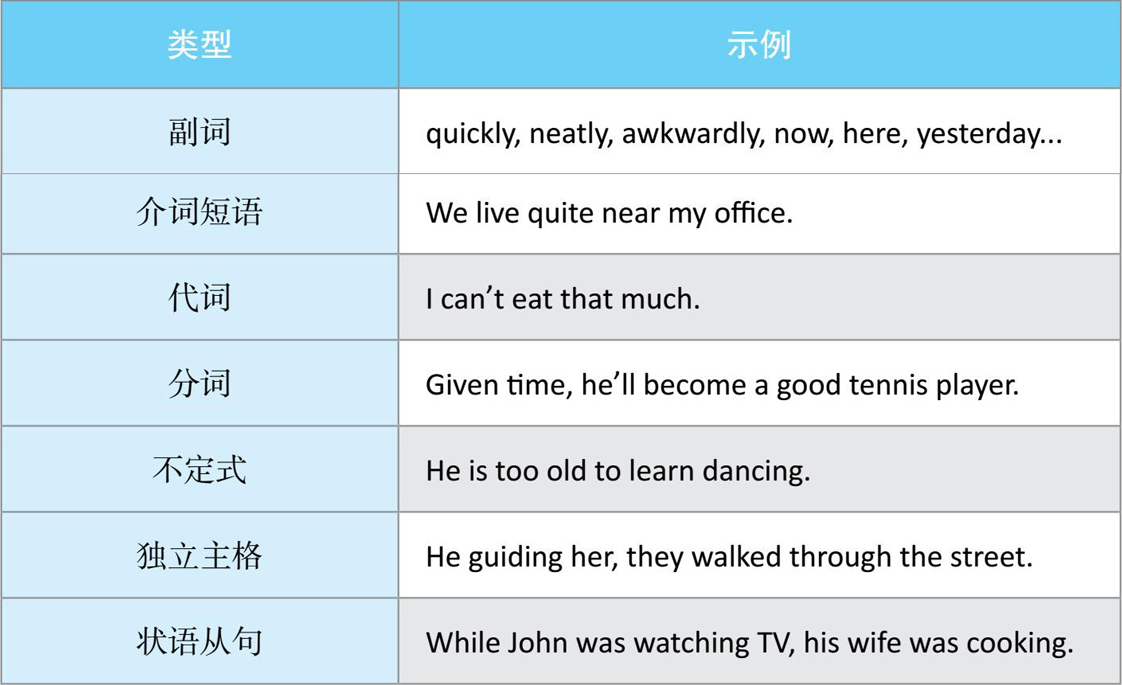
状语的种类:时间、地点、原因、目的、结果、条件、让步、方式、比较
Underline the adverbials of the sentences and point out the type of adverbials.
例:The jets move outward at speeds close to the speed of light .介词短语作状语
1. Dona covered her face with her hand.
2. The girl is remarkably beautiful.
3. To kill bugs, spray the area regularly.
4. At the top we stopped to look at the view.
5. We have walked this far without stopping.
6. Arriving at the station, we learned that the train had already gone.
7. The girl is improving remarkably.
8. This incident, happening at the right time, has helped our career.
9. Albert has so much work to do that he is staying late at the office.
10. I've been feeling slightly ill for a week.
11. There were some thirty people there.
12. We chatted as we walked along.
13. At the moment he's out of work.
14. After taking my name and address, he asked me a lot of questions
15. To avoid this event, a diver must ascent slowly, never at a rate exceeding the rise of the exhaled air bubbles, and must exhale during ascent.
16. It is no wonder that, during the years of these cumbersome arrangements, private letter-carrying and express businesses developed.
17. Nineteenth-century writers in the United States, whether they wrote novels, short stories, poems or plays were powerfully drawn to the railroad in its golden years.
18. The care of children during their years of relative helplessness gradually appears to have been the chief incentive for the evolution of family structures.
19. Small climbing animals may reach twigs readily, but it is harder for them than for large climbing animals to cross the wide gaps from on tree crown to the next that typify the high canopy.
20. These writers who can genuinely be said to have created a genre, the "railroad novel" are now mostly forgotten, their names having faded from memory.
(3)同位语
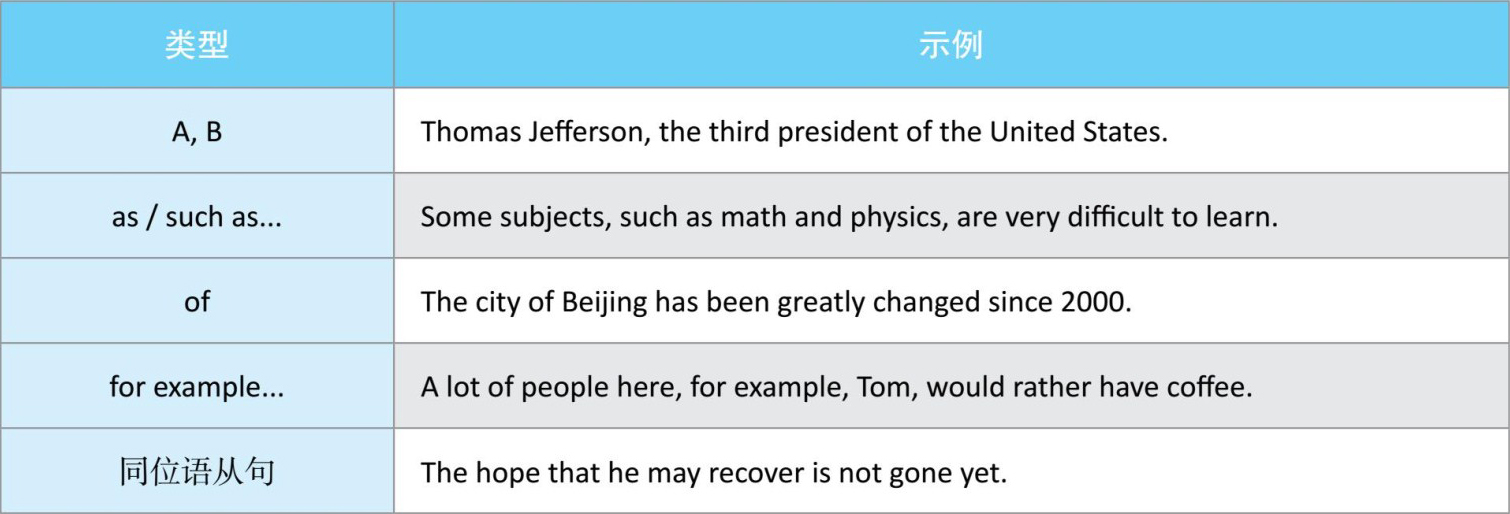
Underline the appositives of the sentences and point out the type of appositives.
1. She was dressed in grey, the color of a pigeons' feathers.
2. We, his students, listened eagerly, busily taking down his words.
3. Marilyn Monroe, a famous movie star, committed suicide.
4. I am pleased with only one boy, namely, George.
5. London, the capital of Great Britain, lies astride the Thames in South Central England.
6. Some animals, for example the fox and squirrel, have bushy tails.
7. Leonard Schlesinger, a Harvard academic and former chief executive of Au Bon Pain, a rapidly growing chain of bakery cafes, says that much "re-engineering" has been crude.
8. As funding for science has declined, scientists have attacked "antiscience" in several books, notablyHigher Superstition, by Paul R. Gross, a biologist at the University of Virginia, and NOrman Levitt, a mathematician at Rutgers University; andThe Demon-Haunted World, by Carl Sagan of Cornell University.
9. Intellect, according to Hosfstadter, is different from native intelligence, a quality we reluctantly admire.
10. I also know that people in Japan and Sweden, countries that spend far less on medical care, have achieved longer, healthier lives than we have.
11. Rather, we have a certain conception of the American citizen, a character who is incomplete if he cannot competently assess how his livelihood and happiness are affected by things outside of himself.
12. One such cause now seeks to end biomedical research because of the theory that animals have rights ruling out their use in research.
(4)插入语
插入语举例:
indeed, surely, obviously, naturally / generally / personally speaking, judging from / by, needless to say, most important of all
by the way, in a few words / in sum / in short, in other words, in general, in one's opinion / judgment, in fact, in the first place, of course, to one's knowledge / surprise / satisfaction
to be sure, to sum up, to tell the truth, to be honest, to be short, to conclude…
插入语处理方式:插入语可以是一个词、一个短语或是一个句子,阅读时通常需要跳读。
Underline the parentheses of the sentences.
1. Business, he reflected, appeared as brisk as ever.
2. We decided, in view of his special circumstances, that we would admit him for a probationary period.
3. To make things worse, many of the men have gone off to cities in search of higher pay.
4. The argument that humans, even in prehistoric times, had some number sense, at least to the extent of recognizing the concepts of more and less when some objects were added to or taken away from a small group, seems fair, for studies have shown that some animals possess such a sense.
5. A detailed study has been made of the prints using photogrammetry, a technique for obtaining measurements through photographs, which created a drawing showing all the curves and contours of the prints.
6. Accustomed though we are to speaking of the films made before 1927 as "silent", the film has never been, in the full sense of the word, silent.
7. A few art collectors Tames Bowdoin III of Boston, William Byrd of Virginia, and the Aliens and Hamiltons of Philadelphia introduced European art traditions to those colonists privileged to visit their galleries, especially aspiring artists, and established in their respective communities the idea of the value of art and the need for institutions devoted to its encouragement.
8. The achievements of the colonial artists, particularly those of Copley, West, and Peale, lent credence to the boast that the new nation was capable of encouraging genius and that political liberty was congenial to the development of taste—a necessary step before art could assume an important role in the new republic.
9. Coincident with concerns about the accelerating loss of species and habitats has been a growing appreciation of the importance of biological diversity, the number of species in a particular ecosystem, to the health of the Earth and human well-being.
 1.1.3 非谓语动词
1.1.3 非谓语动词
在句子中的非谓语动词形式主要包括:不定式(to do)、动名词(V-ing)和分词(包括现在分词V-ing和过去分词V-ed)。
● 第一张表告诉你to do, V-ing和V-ed到底是什么?

● 第二张表告诉你全能的非谓语动词,除了作谓语之外,还能作什么?
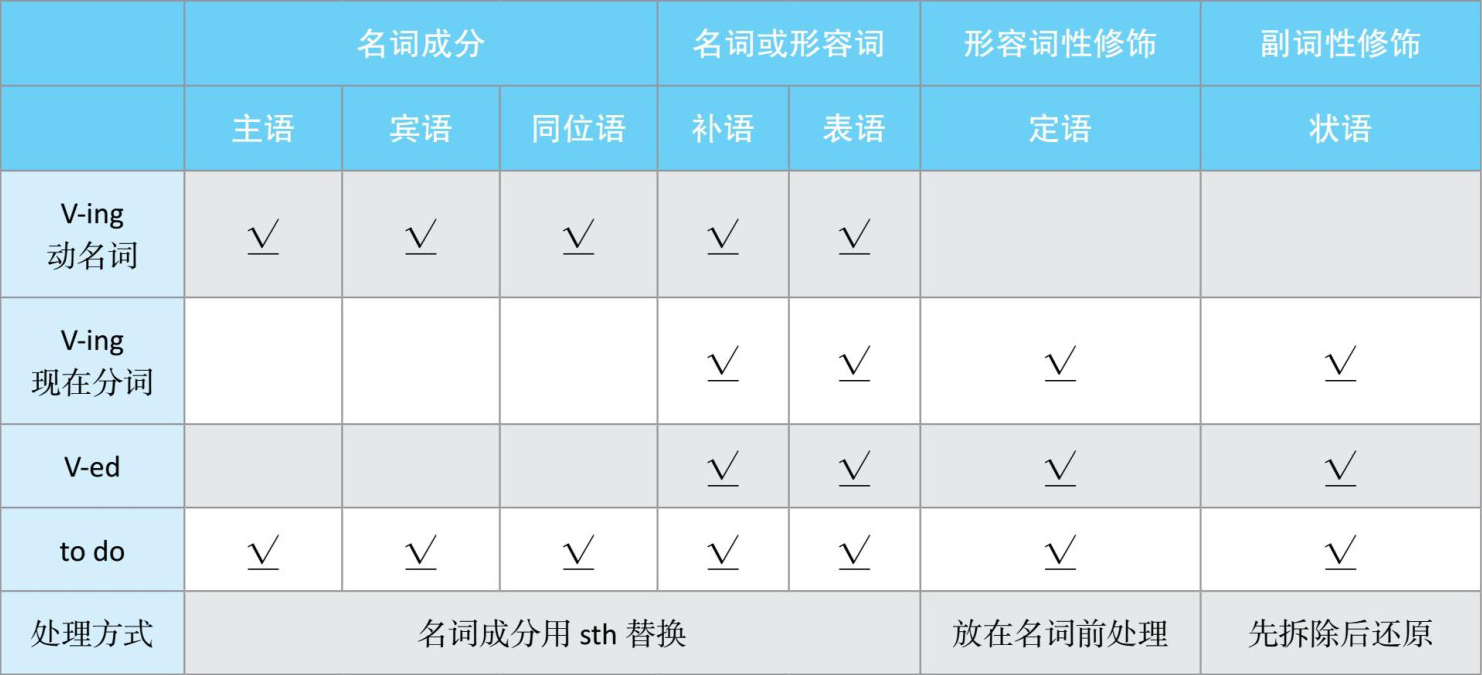
思考:
请判断下列句中的V-ing分别是什么成分?

1. This is an amusing story.
2. The students came into the classroom laughing and talking .
3. I heard him singing in the room last night.
4. Learning a foreign language well is no easy job.
5. My favorite sport is skating .
6. Have you finished correcting the students' paper?
7. They are watching TV.
8. His work is repairing bikes.
9. His ambition, conquering the whole world, was never fulfilled.
10. There is a floating match in the lake.
请判断下列句中的V-ed分别是什么成分?

1. I found most of the population settled in the South.
2. Everybody was excited to hear the news.
3. Several kinds of birds feed on insects flushed out of the grass by grazing cattle.
4. The girl named the newborn puppy Spot.
5. Founded in 1636, Harvard is one of the most famous universities in the United States.
请判断下列句中的to do分别是什么成分?

1. To get there by bike will take us half an hour.
2. My wish to visit France has come true at last.
3. It's our duty to take good care of the old .
4. The driver failed to see the other car in time.
5. We believe him to be guilty .
6. What I would suggest is to put off the meeting .
7. He searched the room onlyto find nothing.
8. The Computer town was formed for just the reason, to bring computers to people .
-ing形式的四种可能:
1. 动词识别:前方有be动词处理方式:理解为正在进行的动作
2. 动名词识别:可接宾语,也可作主语处理方式,即理解为一个名词,用sth替换
3. 分词作定语识别:有修饰对象处理方式,即放在名词之前翻译
4. 分词作状语识别:不可接宾语或作主语,无修饰对象处理方式,即先拆除,再还原
-ed形式的三种可能:
1. 动词识别:周边无动词处理方式,即理解为过去的动作
2. 分词作定语识别:有修饰对象,且周边有动词处理方式,即放在名词之前翻译,表被动
3. 分词作状语识别:周边有动词处理方式,即先拆除,再还原
Multiple choices.
1. _____toward the podium, Julia tried to remember how she'd delivered her speech during the practice session yesterday.
A. Walking
B. To walk
C. Walking was
D. She walked
2. Wolfgang Amadeus Mozart is a composer_____today for his short but productive career.
A. remembered
B. is remembered
C. remembering
D. he is remembered
3. But as soon as he thought it, a beautiful pink flower_____on the path before him. He bent in for a closer look.
A. appearing
B. appeared
C. was appeared
D. to appear
4. Thus, there can be no doubt that the architectural field_____by Gehry' artistic contributions.
A. receiving
B. to receive
C. has received
D. has been received
5. The Brooklyn Bridge_____to connect Manhattan and Brooklyn.
A. built
B. was built
C. has built
D. building
Find the verbs and non-finite verbs of the sentences.
1. Moreover, recent research on obsidian tools found at Olmec sites has shown that some of the obsidian obtained by t he O l me c s o ri gina te d near Teo ti hua cán.
谓语动词:
非谓语动词:
2. Although initially appealing, the hypothesis of a simple climatic change related to sea levels is insufficient to explain all the data.
谓语动词:
非谓语动词:
3. In the seventeenth century, the trading activities of the Dutch East India Company resulted in vast quantities of decorated Chinese porcelain being brought to Europe.
谓语动词:
非谓语动词:
4. A worsening of the plight of deer was to be expected as settlers encroached on the land, logging, burning, and clearing, eventually replacing a wilderness landscape with roads, cities, towns, and factories.
谓语动词:
非谓语动词:
5. The culture of that time, based on archaeology and linguistic reconstruction, is assumed to have had a broad inventory of cultivated plants including taro, yarns, banana, sugarcane, breadfruit, coconut, sago, and rice.
谓语动词:
非谓语动词: